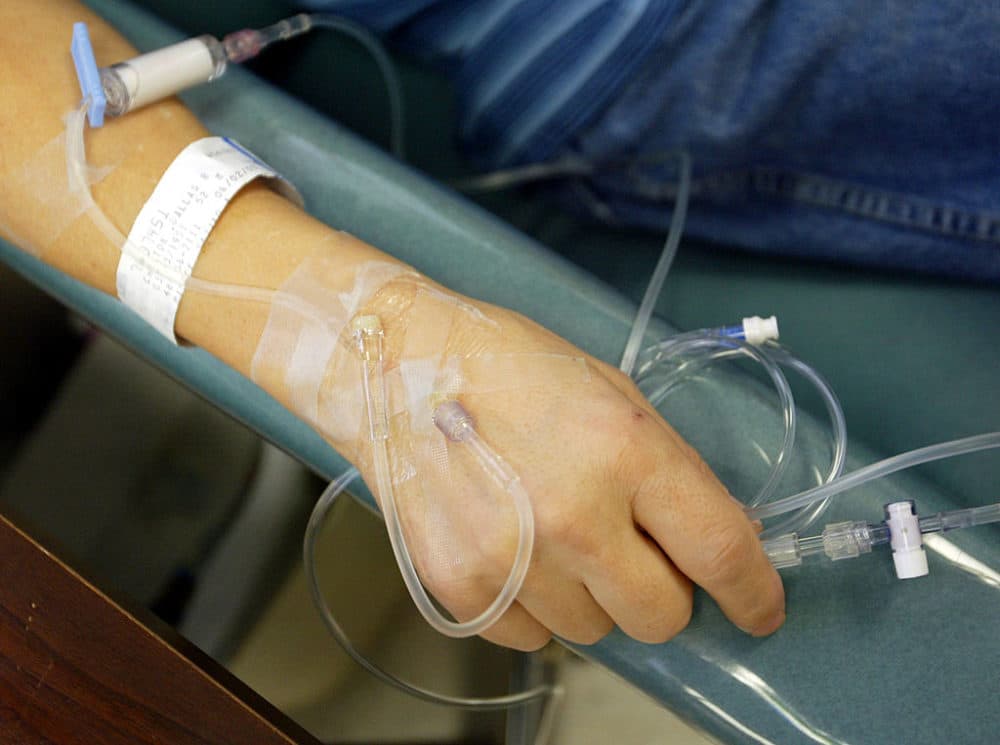Advertisement
For Cancer Patients, Coronavirus Pandemic Presents New Risks To Treatment
Resume
Some doctors are warning that if cancer patients contract COVID-19, the virus could be more dangerous than the cancer itself.
There are about 650,000 cancer patients in the U.S. who are set to have chemotherapy this year. The treatment that gives many the best hope of recovery also puts them in the most compromised position during a viral outbreak, particularly one as contagious as the coronavirus.
That leaves patients with a difficult choice — deciding what is more perilous, delaying chemo treatments or venturing out to receive them and risking contact with the disease.
Chemotherapy targets duplicating cancer cells, but some types can also suppress a patient’s immune system, says Dr. Siddhartha Mukherjee, an oncologist at Columbia University Medical Center and the Pulitzer Prize-winning author of “The Emperor of All Maladies: A Biography of Cancer.”
“Most cancer treatments will kill rapidly dividing cells, and your immune cells are among the most rapidly dividing, so you get immunosuppression as a consequence of chemotherapy,” he says. “And those patients are particularly vulnerable to getting infected and potentially having more severe complications of their infections.”
Despite the risks, Mukherjee says he is advising most of his patients to continue with their treatment during the current pandemic. He says he’s trying “to keep on track” because delaying treatment has the potential to cause future problems.
But if a cancer patient did contract an infection — whether COVID-19 or any other type of infection — it is usually recommended that doctors pause chemotherapy treatment until the patient has recovered, he says.
Cancer patients should also be extra careful about social distancing and handwashing, Mukherjee says. Everyone in the patient’s household should follow the Centers for Disease Control and Prevention’s guidelines, and cancer patients should try to isolate themselves from their family members as much as possible.
But the key to protecting these immunocompromised patients is more testing, he says.
“The cornerstone of all of this is testing other patients, not chemotherapy patients, but testing the broad public to figure out who's infected and who is not infected,” he says. “That is the cornerstone of being able to give safe chemotherapy to patients who are immunocompromised.”
Antibody treatments could also help get health care workers back to work, he says.
“Let's say you're a chemo nurse, and you know that you've been exposed, you're no longer shedding virus, you've acquired memory immunity,” he explains. “Then you are a perfect candidate to return back to work and to be able to give safely chemotherapy to a patient who may be immunocompromised because you are not actively contagious.”
It’s also important to keep cancer patients on track with their treatment because doctors want to prevent complications that would require patients to enter the intensive care unit, Mukherjee says.
“We're probably going to undercount the excess deaths caused by this epidemic because we are counting the deaths that are caused by COVID-19,” he says. “We're not counting the deaths that are caused by the glomming up of hospital beds and ICU beds for people who really, really need treatment for other diseases, such as cancer or heart disease.”
The bottom line: If you want to protect your loved ones who are battling cancer, stay home, Mukherjee says.
“Do them a favor, stay at home,” he says. “Flatten the curve, if not for yourself, then for your loved one who has cancer.”
Karyn Miller-Medzon produced and edited this interview for broadcast with Peter O'Dowd. Samantha Raphelson adapted it for the web.
This segment aired on March 30, 2020.

